Colorado
Hockey fan in Denver says he was attacked because he is gay
In social media posts on Instagram and Facebook, he detailed the incident that occurred just outside Brooklyn’s at Ball Arena on January 26
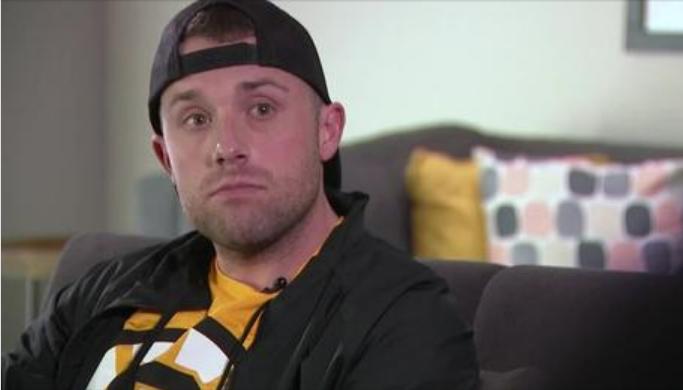
DENVER – Cadien P. Shaw III is a hockey aficionado, a die-hard Boston Bruins fan and he is also openly gay. According to Shaw it was his sexual orientation and not his loyalty to his beloved Bruins that led to his being assaulted outside a popular sports bar in downtown Denver opposite Ball Arena the last week of January.

In social media posts on Instagram and Facebook, Shaw detailed the incident that occurred just outside Brooklyn’s at Ball Arena after the match-up on January 26 between the Colorado Avalanche and his team- which lost.
According to Shaw, what had initially been ‘sports fan’ banter and smack talk turned ugly as the three began to aggressively attack Shaw at first verbally over his sexual orientation. In an interview with local Denver ABC News affiliate KMGH News Channel 7, he recalled:
“At first, it was more of a hockey banter type of thing from them, ‘Oh you lost.’ That type of thing,” Shaw said. “I remember saying something along the lines of, ‘We’ll get you next time.'”
Shaw says the exchange escalated and was no longer about hockey, but rather focused on his sexual orientation.
“It turned to aggressive homophobic slurs,” Shaw added.
The Denver Police Department confirmed their Bias Motivated Crime Unit is investigating the matter.
Facebook Posts:

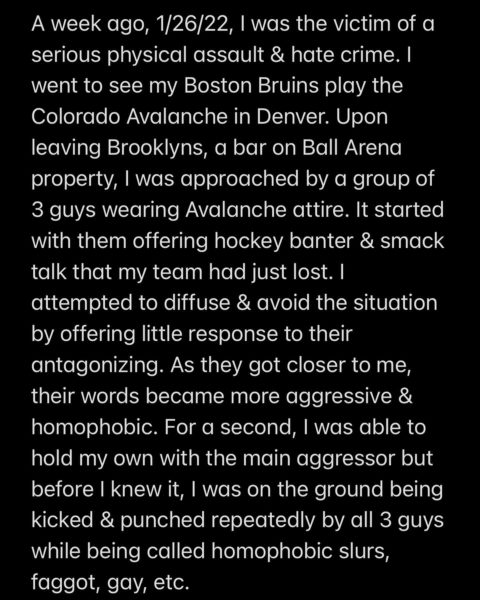


Colorado
Colorado GOP tells parents the Democrats “turn more kids trans”
In a party-wide mass mailing the Colorado Republican Party is urging that all of the state’s parents pull their children from public schools

DENVER, Colo. – In a party-wide mass mailing Tuesday, the Colorado Republican Party is urging that all of the state’s parents pull their children from public schools because, according to the GOP leadership, “Democrats are using schools to “turn more kids trans.”
In the email blast, Republicans allege: “Our next policy aims to save Colorado children from progressive Democrats who want to turn more kids trans by requiring teachers to use “pronouns” that do not make any sense and cause gender confusion.”
The email continues with an attack recent legislation signed into law by the state’s openly gay Governor Jared Polis:
“Sadly, with Democrats in the super majority in Denver, Non-Legal Name Changes- House Bill 24-1039, passed and was signed into law by Governor Polis. The bill, sponsored by four far-left progressives, two of whom do not know their own genders and do not have children, requires teachers in public schools to use “pronouns” for kids with gender confusion that do not align with their actual scientific gender, without parental consent.
If your child decides he identifies as a girl because he is angry with you, or all of his friends are doing it, the Colorado government will actively encourage his new fetish by allowing him to identify as “she,” “they,” or whatever nonsensical terms your son’s teachers and peers may dream up…all without notifying you of your child’s disturbing behavior, which should be treated rather then encouraged.
The goal here is clear; the Colorado legislature seeks to break down the family unit while convincing kids that government knows best.”
Colorado has long been prominent in the culture wars over LGBTQ+ rights, reproductive rights, and being ground zero for the Evangelical Christian movement attacks on LGBTQ+ Americans.
Focus on the Family, founded in 1977 in Southern California by James Dobson, and based in Colorado Springs, has been one of the leading major conservative self labeled “family values” groups that has actively battled over same-sex marriage, equality rights, and trans rights.
NBC News affiliate 9News Denver reported:
Colorado Republicans’ 2022 nominee for Governor, Heidi Ganahl, issued a similar call for families to abandon the public education system last year.
Speaking to the Truth and Liberty Conference in Woodland Park, which mixed anti-LGBTQ rhetoric with calls for Christian dominance of government, Ganahl said children should be removed from public schools and placed in church-run schools.
Ganahl said Colorado’s public schools teach “that parents are not to be trusted, that government is God, that sexual deviance is King.”
Related:
Colorado
Colorado constitution’s same-sex marriage ban may be on ballot
Colorado’s constitution states, “Only a union of one man and one woman shall be valid or recognized as a marriage in this state”

By Sara Wilson | DENVER, Colo. – Colorado voters could be asked to amend the state constitution this fall to remove language against same-sex marriages.
Even though civil unions for same-sex marriage became legal in the state in 2013 — and same-sex marriages became legal nationwide in 2015 with a U.S. Supreme Court ruling — the Colorado constitution retains language that states, “Only a union of one man and one woman shall be valid or recognized as a marriage in this state.”
Voters narrowly approved that language in 2006 through a ballot initiative, but the Legislature is now considering sending a measure to voters to get rid of the sentence.
“As representatives of the people of Colorado, it is our shared responsibility to uphold the principles of equality and justice for all citizens, regardless of political affiliations,” said state Sen. Joann Ginal, a Fort Collins Democrat. “While we’re protected today, our state constitution still reflects outdated language and values.”
Ginal is running the resolution that would put the amendment on November’s ballot. The Senate gave preliminary approval to it on Friday, but still needs to sign off with a recorded vote before it moves to the House.
Constitutional amendments need a supermajority vote in the Legislature, so at least one Republican senator will need to vote yes for it to advance. House Democrats have the votes to pass it without Republican support. If it is put on the ballot, it will need 55% voter approval.
The marriage line in the state constitution is inoperative and unenforceable since the U.S. Supreme Court’s 2015 ruling in Obergefell v. Hodges, but some supporters of same-sex marriage have been concerned about the decision’s longevity after the court’s conservative majority overturned the federal right to an abortion two years ago.
In a concurring opinion in that case, Justice Clarence Thomas — one of the most conservative voices on the bench — wrote that the reasoning the court applied in the Dobbs decision could extend to other rulings that codify rights to contraception access, same-sex relationships and same-sex marriage.
“Our LGBTQ community is very afraid, living in fear that rights will be taken away,” Sen. Sonya Jaquez Lewis, a Longmont Democrat, said.
Sen. Bob Gardner, a Colorado Springs Republican, said on the Senate floor that even if the Obergefell decision is overturned, same-sex marriages in Colorado would still be protected by state law. Changing the constitution would not have a true impact except for the removal of language many people find offensive.
“I think the law is settled. I think, in some ways, the culture of our country is settled on this matter,” he said.
The legislative session ends on May 8.
******************************************************************************************

Sara Wilson covers state government, Colorado’s congressional delegation, energy and other stories for Newsline. She formerly was a reporter for The Pueblo Chieftain, where she covered politics and government in southern Colorado.
******************************************************************************************
The preceding article was previously published by the Colorado Newsline and is republished with permission.
Colorado Newsline provides fair and accurate reporting on politics, policy and other stories of interest to Coloradans. Newsline is based in Denver, and coverage of activities at the Capitol are central to its mission, but its reporters are devoted to providing reliable information about topics that concern readers in all parts of the state, from Lamar to Dinosaur, from Durango to Sterling.
We’re part of States Newsroom, the nation’s largest state-focused nonprofit news organization.
Colorado
Colorado’s high court okays anti-trans ballot initiative effort
Colorado Supreme Court greenlights signature collection for ballot initiative opponents believe would target LGBTQ+ students
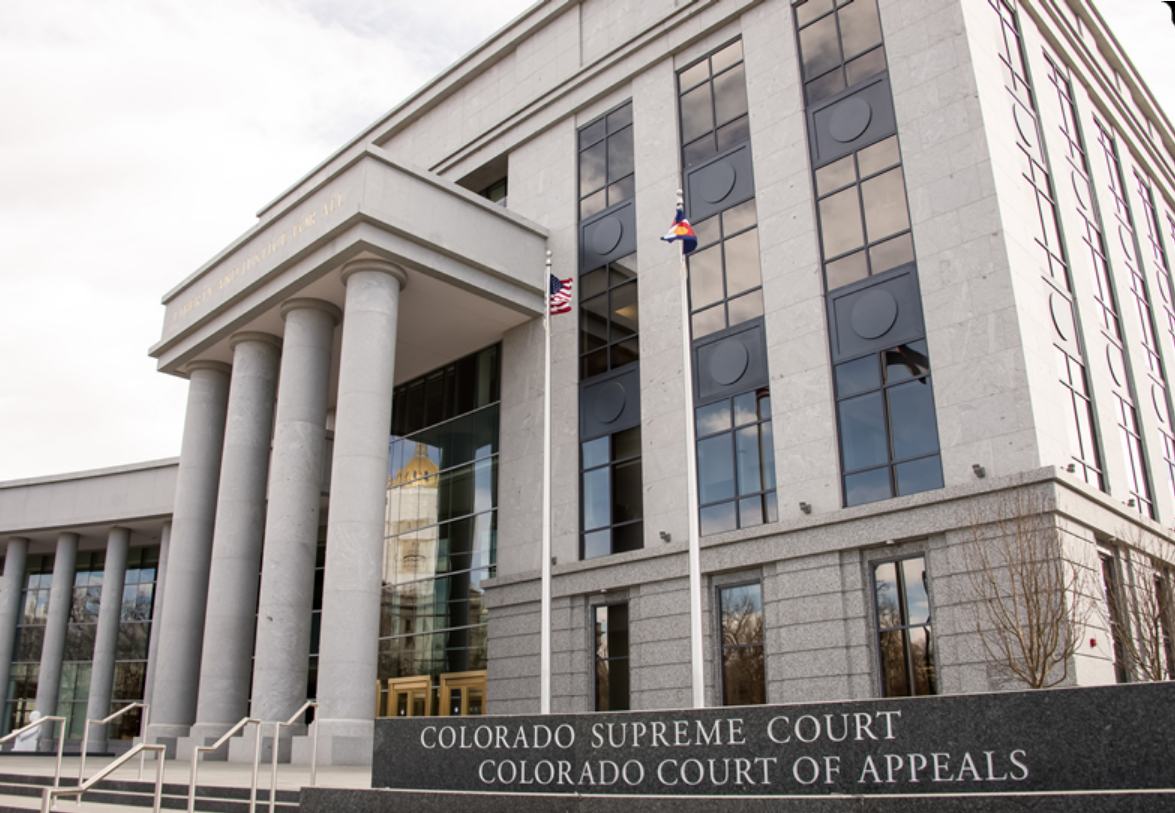
DENVER, Colo. – A conservative group that bills itself as defending parental rights has received approval to collect signatures for a ballot initiative that would forcibly out transgender students in the state’s schools.
“We believe this measure is so supportive of our kiddos that do identify as LGBT,” Lori Gimelshteyn, executive director of the Colorado Parent Advocacy Network, told Denver’s NBC News affiliate KUSA 9 news. Gimelshteyn helped write the ballot initiative.
“We very strongly believe that parents are the ones that know best and help them,” she said.
According to KUSA, the measure was approved by the Colorado Title Board, but opponents including LGBTQ advocacy group One Colorado and Out Boulder County, challenged the decision with the Colorado Supreme Court. Late last week, the court affirmed the initiative, giving it the go-ahead to begin collecting signatures.
The exact text of the ballot measure states, “Any public school representative who obtains information that a child enrolled in their public school is experiencing gender incongruence shall notify the child’s parents within 48 hours of receiving such information.”
In a statement to the Blade Thursday, the executive director of Out Boulder County, Mardi Moore reacted noting that the Colorado Supreme Court decision “to allow the collection of signatures to place a measure on our November 2024 ballots that is an attack on our teachers, students, and families.”
“Today is a sad day in Colorado. Despite our state’s long history of honoring individual rights and freedoms, the Supreme Court has ruled that a vocal minority can begin collecting signatures from Coloradans to codify government overreach in our schools, communities, and lives. If successful, their efforts will place an additional administrative burden on our already-overworked teachers and school administrators and expose them to frivolous and costly lawsuits.
“The proponents of this measure do not understand Colorado’s values. And they do not care about the other consequences this ballot measure will have on teachers, kids, and families. You will hear several things about the measure they are gathering signatures for to put on our election ballot – that they want to protect kids, that it will only affect one part of the LGBTQ+ community – but they are lying to you.
“Out Boulder County will do everything in our power to ensure our teachers, kids, and families can be who they are and feel safe in schools.”
KUSA 9 News also reported that the Colorado Parent Advocacy Network has until August to collect about 125,000 signatures to get the measure on the ballot.
“You can be ensured that our volunteers, our staff and our large community will do everything possible to ensure this is not passed in the state of Colorado,” Out Boulder County‘s Moore told KUSA. “We’ve had big wins. I don’t think Colorado will be any different.”
Colorado Parent Advocacy Network’s Gimelshteyn hopes to start collecting signatures on this measure by the end of this week. She told KUSA every local school district will have the ability to write a policy around how this measure will be implemented, if it does get on the ballot and pass.
Other Anti-LGBTQ measures
The Colorado Parent Advocacy Network effort is only one of several ballot initiatives targeting Colorado’s LGBTQ+ community. The Colorado Newsline reported two measures sponsored by Erin Lee, a Fort Collins anti-LGBTQ activist who since 2022 has made a string of appearances in conservative media crusading against what she calls the “indoctrination” of children by “predators” at public schools, have been approved by the Title Board. One would require Colorado public schools to notify parents when their child shows signs of “experiencing gender incongruence” at school, and another would codify a parent’s “legal right to review their child’s school records.”
Lee, her husband and two other parents sued the Poudre School District in federal court last year, alleging that her daughter’s experience with an after-school Genders and Sexualities Alliance club, which “introduced concepts of gender fluidity and various types of sexual attraction,” violated their constitutional rights as parents. Their characterization of some of the club’s discussions and materials has been disputed, and their lawsuit was dismissed.
Another set of ballot measures targeting transgender Coloradans has attracted high-profile support from prominent Republican politicians. One would prohibit transgender athletes from competing in “a sport or athletic event designated as being for females, women or girls.” The other proposes a sweeping ban on medical procedures and hormone treatments for transgender people under the age of 18.

The Title Board, however, ruled that both measures violate the single-subject rule, and upheld their decisions again last week, prompting criticism from Greg Lopez, the GOP’s nominee for a 4th Congressional District special election in June, and former state Sen. Kevin Lundberg.
“I believe it is doing a great disservice to we the people in Colorado, who reserve the right to make law independent of the General Assembly,” Lundberg said. “I’m saying this to you very directly, because I guarantee I’m going to say this publicly — you need to know that if … you’re going to say this is not a single subject, that’s a violation of our Constitution.”
Hearings on the anti-transgender initiatives have been marked by unusually tense scenes at the normally tranquil Title Board, including a session last month during which supporters of the initiatives shouted at board members while filming the hearing with their phones. Conley, the board chair, told Lundberg that his comments about speaking “publicly” were part of a pattern she found “unnerving.”
“We have put in a tremendous amount of effort, we are doing our best, we are seeking to be consistent. I am constantly concerned about being doxxed online,” Conley said. “People can always comment on public processes. It is in the news all the time. But to be reminded and directed at it, I can’t help but think that there’s a little bit of a hidden message there that is not appreciated and won’t be tolerated.”
Additional reporting by Chase Woodruff, the Colorado Newsline.
Colorado
Transgender, nonbinary ICE detainees allege mistreatment at Colo. detention center
Advocacy groups filed complaint with federal officials on April 9

AURORA, Colo. — Five Transgender and nonbinary people who are in U.S. Immigration and Customs Enforcement custody at a privately-run detention center in Colorado say they continue to suffer mistreatment.
The Rocky Mountain Immigrant Advocacy Network, the National Immigration Project and the American Immigration Council on April 9 filed a complaint with the Department of Homeland Security’s Offices for Civil Rights and Civil Liberties, Immigration Detention Ombudsman and Inspector General and ICE’s Office of Professional Responsibility on behalf of the detainees at the Aurora Contract Detention Facility near Denver.
Charlotte, one of the five complainants, says she spends up to 23 hours a day in her room.
She says in the complaint that a psychiatrist has prescribed her medications for anxiety and depression, but “is in the dark about her actual diagnoses because they were not explained to her.” Myriah and Elsa allege they do not have regular access to hormones and other related health care.
Omar, who identifies as Trans and nonbinary, in the complaint alleges they would “start hormone replacement therapy if they could be assured that they would not be placed in solitary confinement.” Other detainees in the complaint allege staff have also threatened to place them in isolation.
“They have been told repeatedly that, if they started therapy, they would be placed in ‘protective custody’ (solitary confinement) because the Aurora facility has no nonbinary or men’s Transgender housing unit,” reads the complaint. “This is so, despite other Trans men having been detained in Aurora in the past, so Omar is very likely receiving misinformation that is preventing them from accessing the treatment they require.”
Omar further alleges staffers told them upon their arrival that “they had to have a ‘boy part’ (meaning a penis) to be assigned to” the housing unit in which other Trans people live. Other complainants say staff have also subjected them to degrading comments and other mistreatment because of their gender identity.
“Victoria, Charlotte and Myriah are all apprehensive about a specific female guard who is assigned to the housing unit for Transgender women at Aurora,” reads the complaint. “Victoria has experienced this guard peering at her through the glass on the door of her form. Charlotte, Myriah and the other women in her dorm experienced the same guard making fun of them after they complained that she had confiscated all of their personal hygiene products, like their toothbrushes and toothpaste, and replaced them with menstrual pads and tampons, which she knows they do not need.”
“She said something to them like, ‘If you were real women, you would need these things,'” reads the complaint. “The same guard told them that they had to ask her for their personal hygiene products when they wanted to use them, stripping them of their most basic agency.”
Victoria, who has been in ICE custody for more than two years, also says she does not have regular access to hormones. Victoria further claims poor food, lack of access to exercise and stress and anxiety because of her prolonged detention has caused has made her health deteriorate.
The GEO Group, a Florida-based company, operates the Aurora Contract Detention Facility.
Advocates for years have complained about the conditions for Trans and nonbinary people in ICE custody and have demanded the agency release all of them.
Roxsana Hernández, a Trans Honduran woman with HIV, on May 25, 2018, died in ICE custody in New Mexico. Her family in 2020 sued the federal government and the five private companies who were responsible for her care.
Johana “Joa” Medina Leon, a Trans Salvadoran woman, on June 1, 2019, passed away at a Texas hospital four days after her release from ICE custody. Kelly González Aguilar, a Trans Honduran woman, had been in ICE custody for more than two years until her release from the Aurora Contract Detention Center on July 14, 2020.
ICE spokesperson Steve Kotecki on Friday told the Blade there were 10 “self-identified Transgender detainees” at the Aurora Contract Detention Center on April 11. The facility’s “transgendered units” can accommodate up to 87 Trans detainees.
A 2015 memorandum then-ICE Executive Associate Director of Enforcement and Removal Operations Thomas Homan signed requires personnel to allow Trans detainees to identify themselves based on their gender identity on data forms. The directive, among other things, also contains guidelines for a “respectful, safe and secure environment” for Trans detainees and requires detention facilities to provide them with access to hormone therapy and other Trans-specific health care.
“U.S. Immigration and Customs Enforcement (ICE) is committed to ensuring that all those in its custody reside in safe, secure and humane environments,” said Kotecki. “ICE regularly reviews each case involving self-identified Transgender noncitizens and determines on a case-by-case basis whether detention is warranted.”
The complaint, however, states this memo does not go far enough to protect Trans and nonbinary detainees.
“ICE’s 2015 guidance has some significant flaws,” it reads. “It fails to provide meaningful remedies for policy violations. It does not acknowledge the challenges that nonbinary people face when imprisoned by ICE and the lack of such guidance explains why the needs of nonbinary people are largely misunderstood and unmet.”
“Further, the language used to describe people who are TNB is not inclusive and does not reflect terminology adopted by the community it is meant to describe,” adds the complaint. “Although this list is not exhaustive, it addresses some of the primary concerns voiced by the complaints.”
Colorado
Children’s Hospital Colorado sued: Trans male refused surgery
According to the suit, CHCO has no similar ban when patients seek the same procedures for reasons other than treatment of gender dysphoria

DENVER, Colo. – The ACLU of Colorado filed a lawsuit Wednesday Feb. 14 on behalf of an 18-year-old male transgender patient of Children’s Hospital Colorado (CHCO), alleging that the hospital violated state anti-discrimination laws when it stopped providing medically necessary surgeries to transgender patients over the age of 18 without warning, notice, or plans for ensuring continuity of care.
The plaintiff, who is proceeding under the pseudonym Caden Kent to protect his privacy, had just received insurance authorization for a procedure at CHCO when it adopted the exclusionary policy and refused to move forward with his care.
For many transgender people, gender-affirming surgical care is medically necessary and can be life-saving. It is evidence-based, safe care that effectively treats gender dysphoria and can alleviate its most serious symptoms, including severe emotional distress and suicidal ideation.
“CHCO’s abrupt cancellation of all gender-affirming surgeries for its trans patients was devastating to Caden, other impacted patients, and Colorado’s transgender community,” said Tim Macdonald, ACLU of Colorado Legal Director. “Refusal to provide medically necessary care based on the identity of the person seeking it, and the condition for which they are seeking it, is discriminatory and illegal under the Colorado Anti-Discrimination Act.”
According to the complaint, CHCO has no similar ban when patients seek the same procedures for reasons other than treatment of gender dysphoria.
The complaint also states that CHCO provides care to non-pediatric patients in certain circumstances and had previously provided medically necessary surgeries to transgender young adults being treated for gender dysphoria at CHCO before they turned 18. Before its abrupt change in policy, CHCO was one of the few medical facilities in Colorado where transgender patients unable to pay out-of-pocket could access treatment with their insurance.
With the support of his family, Caden began receiving care at CHCO for his gender dysphoria several years ago. His life improved tremendously with treatment. Later, he began consulting with his CHCO care team about seeking gender-affirming surgery once he turned 18.
After more than eight months of consultation and individualized assessment, CHCO determined Caden was an appropriate candidate for surgery and such treatment was medically necessary. Caden was on track to be scheduled for the procedure, but on the same day he submitted an insurance authorization letter — the final step before his surgery date could be set — a CHCO physician’s assistant notified him that under new CHCO policy, effective immediately, his procedure could not move forward.
The complaint asserts that CHCO violated the Colorado Anti-Discrimination Act by denying Caden full and equal access to care on the basis of sex, gender identity, gender expression, and disability.
“Caden came forward to protect other transgender people from the discrimination he experienced,” said Emma Mclean-Riggs, ACLU of Colorado Staff Attorney. “Transgender people have the right to access necessary medical care, without fear that they may be denied that care because of who they are. Medical providers should ensure their policies and practices are non-discriminatory or prepare to be held accountable in court.”
Related:
Colorado
Club Q in Colorado Springs to reopen in new location
The new location will be managed and operated by survivors of the shooting. The owners are offering former employees of Club Q jobs as well
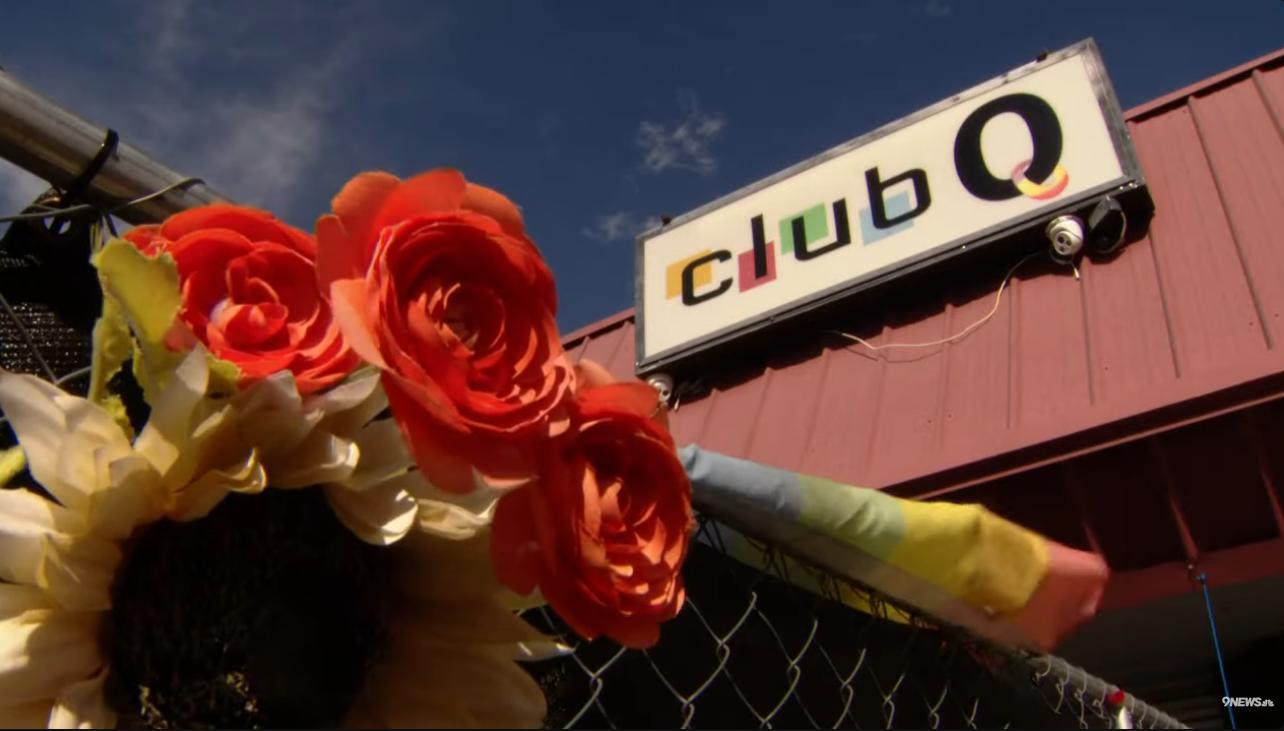
COLORADO SPRINGS, Colo. – Eleven months after a shooter murdered five people and caused injuries to 25 others, 19 wounded by gunfire, at the LGBTQ+ Club Q nightclub in Colorado Springs, the LGBTQ+ community are getting a new place to call home.
Colorado Springs ABC News affiliate KRDO 13 reported that while Club Q officials initially stated that they were going to remodel their original building, they have now decided they’re moving to a new location, the Satellite Hotel in Southern Colorado Springs.
The new venue will now be known as “The Q”. The biggest change is that the new spot will no longer be a nightclub but instead a bar and restaurant, that will host drag shows and other events.
The owners of Club Q told KRDO the new location will be managed and operated by survivors of the shooting. The owners are offering former employees of Club Q to join “The Q” as they work to build a new team.
Related:
Denver’s NBC News affiliate KUSA 9 reports:
Colorado
First ever Colorado Queer Comedy Festival
The Colorado Queer Comedy Festival aims to highlight comics from Colorado and beyond, giving them access to the stage through the weekend
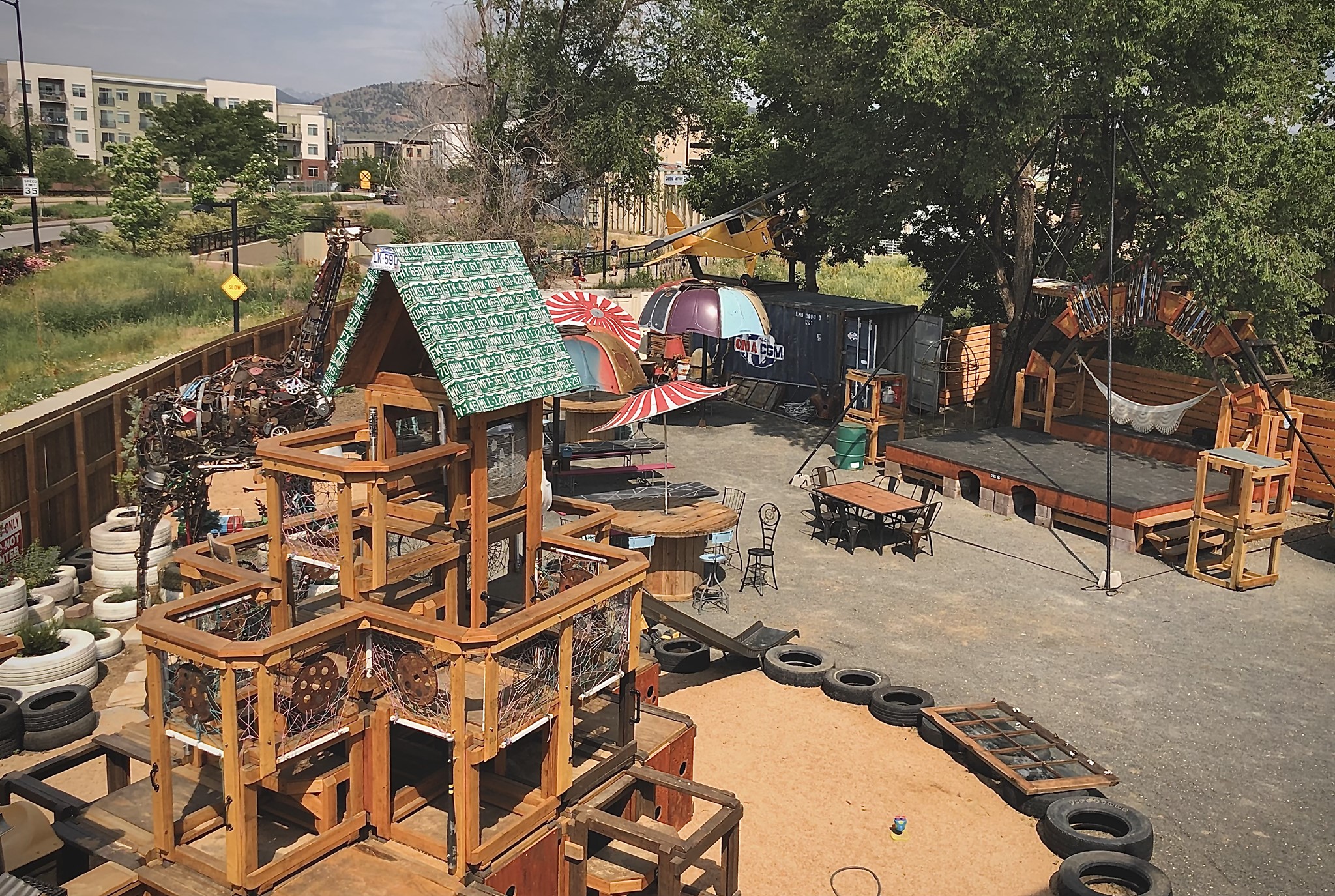
BOULDER, Colo. – At a time when the political and cultural climate is dangerous for lesbian, gay, bisexual, transgender, and queer (LGBTQ+) people across the United States, Out Boulder County, Junkyard Social Club and eighteen of the funniest LGBTQ+ people in the world are inviting Coloradoans to come laugh together at the first ever Colorado Queer Comedy Festival.
The festival will be held on Friday, October 27 and Saturday, October 28 at the Junkyard Social Club (2525 Frontier Ave. Suite A, Boulder, Co 80301). Doors open at 7:30pm and the show starts at 8pm.
The Colorado Queer Comedy Festival aims to highlight comics from Colorado and beyond, giving them access to the stage through a weekend of hilarious content unlike any seen before.
Featuring top-notch comedians from every corner of Colorado’s queer community, the need for this kind of event is clear and evident. Humor brings us together, and storytelling helps us transmute pain into ecstasy. Queer joy is a direct act of resistance, and comedy allows us the opportunity for dialogue that other platforms fail at achieving—in the words of John Cleese: “laughter is a force of democracy.” Queer comedy is direct action. We hope you can join us for both nights!
“Laughter saves lives and makes life worth living. Comedy has always been political and is an act of resistance, but we are sponsoring the first ever Colorado Queer Comedy Festival because members of our community deserve to laugh together,” said Mardi Moore, Executive Director of Out Boulder County. “This event is about building community, promoting resilience, and above everything else–having fun.”
LGBTQ+ communities have always relied on humor to survive in times that are often hostile, and at times deadly, for members of the community. This event will feature eighteen queer and trans comedians from across Colorado with a few from across the country. More than 50 comics submitted applications to perform at the festival. The performers were selected by a panel of judges who represent the diversity of the LGBTQ+ community.

“Queer comedy is direct action,” said Ren Dawe, stand up comic and lead organizer of the festival. “Being out and proud–on a microphone, nonetheless–is a direct act of a resistance to attitudes and policies that try to prohibit or extinguish queer and trans existence. This work is important, it’s necessary, and it just so happens to bring joy and education to our community. Queer comedy is its own kind of activism.”
The Junkyard Social Club, known for its quirky community space and commitment to social causes, will set the stage for two evenings of non-stop laughter and education.
Junkyard Social Club is thrilled to partner with Out Boulder to create a platform for LGTBQ+ comics to share their stories with the community. “We strive to be a safe space for all to connect and take healthy risks,” said Jill Katzenberger, Executive Director of Junkyard Social Club. “Getting up on stage and bearing your soul through comedy has got to be one of the most next-level, ‘healthy risks’ a person could take.”
The Colorado Queer Comedy Festival is the most diverse comedy festival in Colorado’s history and is the first of its kind in Colorado. Every comic is queer or trans and they represent the full spectrum of diversity in the LGBTQ+ community with different racial and ethnic backgrounds, social class statuses, and religious backgrounds included. Attendees can expect a dynamic mix of stand-up, sketches, and improv, all united by an undercurrent of education and the pure, unadulterated love of comedy.
Tickets can be purchased here: (Link)
Colorado
Chat logs: Fire-Breathing Lesbians & Satan-Worshipping S.O.Bs
The private chat logs of a Christian conservative Colorado school district group- its campaign to ban LGBTQ books & enact anti-LGBTQ policies
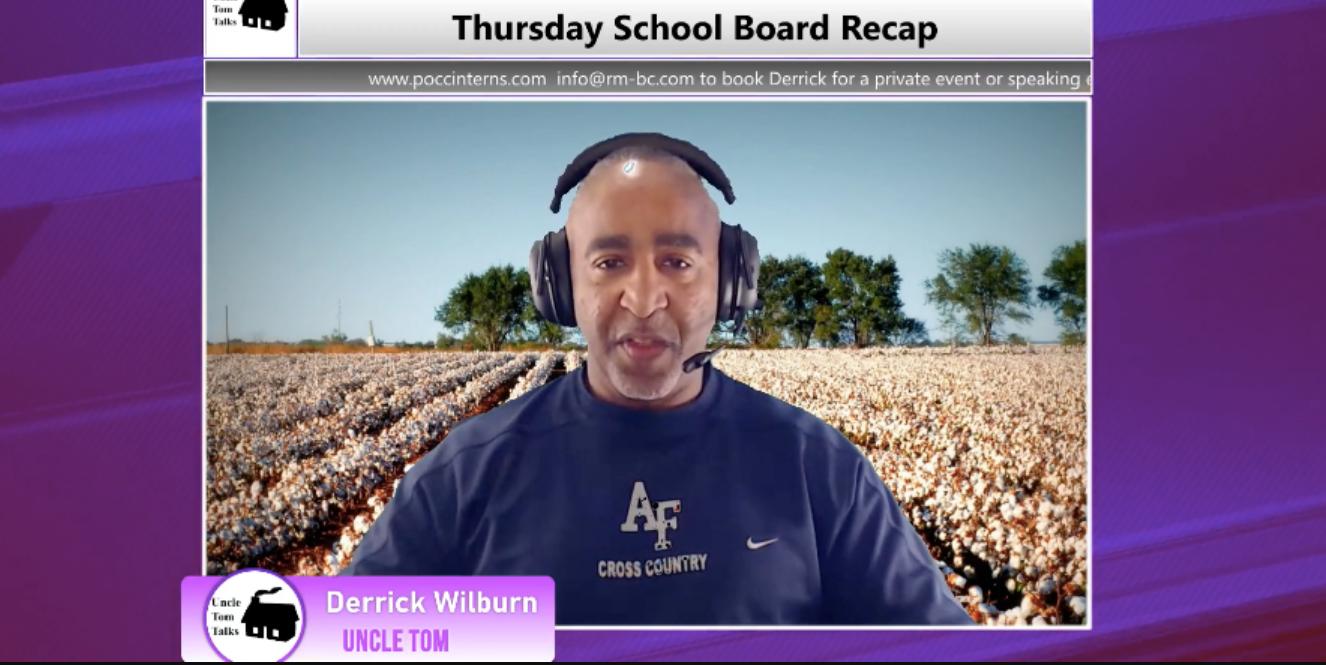
By Heidi Beedle | COLORADO SPRINGS, Colo. – The Colorado Times Recorder has obtained chat logs from the Discord server of the Colorado Springs activist group Advocates for D20 Kids, which has advocated against LGBTQ-inclusive policies and books in Academy School District 20.
Members of the server, which functions as the group’s online chat platform, include two sitting D20 board members, Tom LaValley and Nicole Konz, as well the Cortney Salt, wife of Aaron Salt and organizer with education nonprofit Engage the Rockies. Other members include both conservative board candidates, Derrick Wilburn and Amy Shandy, former Moms for Liberty co-chair Darcy Schoening, D11 Achievement Alliance spokesman Joel Sorensen, Foundation Against Intolerance and Racism (FAIR) activist Joseph Boyle, as well as D20 staff members.
Wilburn is one of the primary organizers within the Advocates for D20 Kids Discord server. Wilburn has long been involved in conservative politics, serving as the executive director of Rocky Mountain Black Conservatives, and hosting the podcast “Uncle Tom Talks” on the Conservative Daily website, which is owned by Douglas County election conspiracy advocate Joe Oltmann, who has claimed that public school teachers “recruit kids to be gay” and has suggested that LGBT-affirming teachers should be “dragged behind a car until their limbs fall off.”
Wilburn’s journey to education activism began in August, 2021, when his public comment on critical race theory at a District 49 board meeting went viral. The manufactured outrage over critical race theory in D49, spread by Wilburn and others, led to the election of Ivy Liu, whose tenure saw loss of two members of D49’s executive leadership team, and her censure for quoting Hitler. Liu was recently arrested for felony charges of menacing with a weapon and false imprisonment.

Following his viral public comment in D49, Wilburn took part in a protest at the D20 Education and Administration Center in September, 2021, where he urged the crowd to call every school board candidate and ask them their position on masks and vaccines. During that election, LaValley, Konz, and Aaron Salt were elected, flipping D20’s board to a conservative majority.
In April, 2022, Wilburn spoke at an election conspiracy event at the Denver Capitol headlined by MyPillow CEO Mike Lindell, who was served with a defamation lawsuit during the event. Other speakers alongside Wilburn included former Mesa County Clerk Tina Peters, who is currently facing felony charges for a breaching the security of Mesa County’s voting machines, “America’s Mom” Sherrona Bishop, Oltmann, and other prominent election conspiracy advocates.

Wilburn has also made a number of appearances at Church For All Nations in Colorado Springs, warning about the dangers of After School Satan Clubs, Naruto manga, and books about progressive politics and LGBTQ people. Last month, Wilburn appeared alongside Church For All Nations’ pastor, Mark Cowart on Andrew Wommack’s Truth and Liberty call-in show.
Wilburn’s comments in the Discord server shed more light on his organizing activity in D20 and his attitudes towards LGBT people, constituents, and current board members.
In August, 2022, Wilburn urged members of the Advocates for D20 Kids Discord to sign a petition to remove the “curricular” status of D20’s Gay Straight Trans Alliance (GSTA) clubs. The letter accompanying the petition, provided to the Discord by Wilburn, notes, “These flyers discussing gender and/or sexuality have no place in our schools and certainly should not be placed in hallways for all to see and read. Many of our children have expressed strong feelings of unease over such materials being displayed, thus their sense of ‘belonging’ is being threatened. As a result, the schools are creating comfort for some students at the expense of others. We believe the current club policies and lack of boundaries regarding club postings are not fostering a culture of belonging for all students; in actuality, the environment in some schools is quite the opposite.”
In response to an April, 2023 post from a Discord user calling trans health care a “death cult” and equating LGBT-affirming policies to “child abuse,” Wilburn responded, “We’re all devout Christian conservatives & all, including Kris [Garofalo, who is Wilburn and Shandy’s campaign registered agent], stand in complete agreement with you on the topic of LBGT grooming & the dangers it presents.”

In December, 2022, Wilburn warned the Discord, “ITS ALL HANDS ON DECK ADVOCATES, ITS JUST THAT SIMPLE. WE NEED EVERYBODY!!! Every lesbian in El Paso county is going to show up at tomorrow night’s BOE meeting breathing fire. If ever there was a time for you to personally get in the game, this is it.”
Last month, the district took action against the GSTA clubs, as recommended by the Advocates for D20, according to reporting from KRDO.
Wilburn’s animosity isn’t just directed at the LGBTQ community broadly. Wilburn regularly singles out El Paso County Democratic Party 1st Vice Chair Rob Rogers in the Discord. Following a June straw poll for conservative board candidates, Wilburn referred to Rogers as “that lying, cheating, immoral, satan-worshipping s.o.b.,”
In February, Wilburn posted, “I’ve been dealing with my feelings toward certain characters on the left (no need to name names, you all know) & thinking about a jokingly told prayer by John Hagee years ago wherein he said, “Bless ’em, Lord, ….with a brick!” and have frankly been saying to myself – if something horrible where to happen to [fill in this blank – Rogers, Matisek, Hoff, etc.], well, my response would be less than Christ-like.”
Members of the Discord have also targeted employees of D20. In August, in response to the Colorado Springs Gazette’s coverage of D20’s actions on books identified by the group, Brian Moody, the Advocates for D20 Kids chairman, posted, “Once Derrick and Amy are elected we need to fire Allison Cortez [D20’s Chief Communications Officer] and Tanya Thompson [D20’s general counsel]. This whole article is just Cortez, Rogers and behind the scenes Thompson at work. If there was a Playboy magazine being handed out by a school librarian, no one would dispute Tom [Gregory, superintendent]’s authority to step in and stop it. Tom assessed these books to be pornographic (and in violation of obscenity laws) and removed them. Once big bad Rogers stepped in, everyone got weak kneed and put the porn back in its rightful place for our children to access.”
Wilburn has also mentioned incumbent candidate Heather Cloninger, posting in April, “Advocates, and please plan to attend this very important event next month. I’m constantly working on things behind-the-scenes and for months I’ve been putting together ‘OPERATION HEATHER TAKEDOWN.’ OHT will get formally & for the first time publicly rolled out at this event on 5/16. Let’s pack the house!!!”
The event in question was hosted by conservative activist group Spunky Patriots and saw Wilburn speaking alongside Rocky Mountain Gun Owners Executive Director Taylor Rhodes.

Wilburn also used the Discord to communicate with D20 board members. “THANK YOU @Tom Lavalley for sticking to your principles, not backing down last Thursday night, putting it right in Heather Cloninger’s face and for knocking this whole ‘book banning’ narrative completely out of the ballpark,” wrote Wilburn in a June post. “You allowed Heather Cloninger to show the world who she really is & what values she & those who adore her truly hold. They WANT PORN in our schools. She came right out and said it into a microphone and with cameras rolling. Nowhere to hide on this one. Good job, sir.”
The presence of LaValley and Konz in the Discord could potentially raise concerns of violations of Colorado’s Open Meetings Law, should Wilburn or Shandy win election. Three or more members constitutes a quorum.
“It’s not a violation of the open meetings law for two members of a school board to discuss school board business on Discord or any other kind of electronic platform,” said Jeff Roberts of the Colorado Freedom of Information Coalition in an email. “But if this online community then includes a third or fourth member of the board, those members must be careful not to discuss any public business related to the school board’s policy-making responsibilities. Otherwise, it’s a “meeting” subject to the requirements of the open meetings law, which means they’d have to let the public attend somehow. And if it’s a five-member school board, they’d have to provide full and timely notice of those meetings to the public. Hard to do for an invite-only online forum that most people probably haven’t heard about.”
During a recent candidate forum, Wilburn touted his endorsements, which include a number of prominent Republican politicians such as U.S. Rep. Doug Lamborn (R-CO) and U.S. Rep. Paul Gosar (R-AZ), who has numerous ties to white nationalists such as Nick Fuentes.
Wilburn did not respond to an emailed request for comment.
The election is Nov. 7.
This is part one of a multi-part series. Read part two here. Read part three here.
The chat logs go back to last August and can to be downloaded here:
AdvocatesFull101023.txtDownload
To view the file, first, save this Viewer file to your computer. Then you can open the downloaded viewer in your browser, click Load File, and select the chat logs to view.
*************************************************************************************

Heidi Beedle is a former soldier, educator, activist, and animal welfare worker. They received a Bachelor’s in English from UCCS. They have worked as a freelance and staff writer for the Colorado Springs Independent covering LGBTQ issues, nuclear disasters, cattle mutilations, and social movements. Heidi currently covers reproductive justice and politics for the Colorado Times Recorder.
*************************************************************************************
The preceding article was previously published by the Colorado Times Recorder and is republished with permission.
Related:
Advocates for D20 Kids Discord Data: [ Link ]
Colorado
Trans Colo. State Rep. shares lessons from legislative victories
Privacy and autonomy are under attack whether the targets are reproductive rights or the rights to access gender affirming care
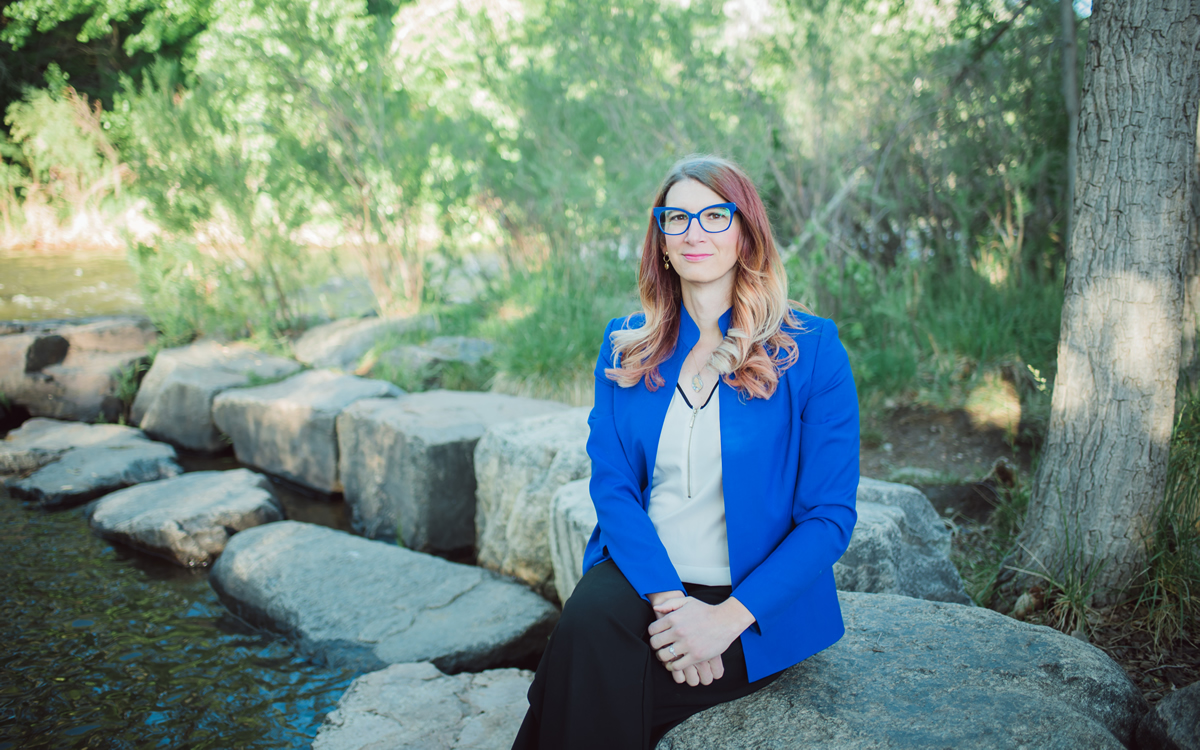
WASHINGTON – Recently, the focus of interviews of trans Colorado State Rep. Brianna Titone (D) have largely been defined by matters like last November’s deadly anti-LGBTQ shooting at Club Q in Colorado Springs and the escalating legislative attacks on the trans community.
However, when she sat down with the Washington Blade on Thursday in the Washington, D.C. offices of the LGBTQ Victory Fund and Institute, Titone dove into another challenge that she, perhaps more than any other state lawmaker, has taken on directly:
Why is it so difficult, or even impossible, for consumers, even those with the inclination and know-how, to repair their automobiles, wheelchairs, farm equipment, and electronics like printers, smartphones, and, as Titone experienced, video game consoles?
A self-described “tinkerer and scientist” who has a degree in information communications technology and considerable programming experience, Titone was dogged by the question after discovering there was no way for her to fix the optical drive of her Xbox. “I couldn’t even figure out how to open the thing because there’s not even a screw on it,” she said.
As it turned out, the answer was even more frustrating.
Reading about the “right to repair” movement, Titone learned how manufacturers deliberately, anticompetitively, and, many argue, unlawfully erect barriers that discourage or prohibit their customers from fixing certain products – by, for example, allowing only the manufacturer’s own maintenance services, restricting access to tools and components, and implementing software barriers.
Titone was first elected in 2018, becoming Colorado’s first openly trans state lawmaker and only the fourth in the U.S. Shortly afterwards, she said, Colorado Gov. Jared Polis (D) – who is the country’s second openly-LGBTQ governor – asked Titone to create and introduce a right to repair bill.
She was ultimately successful by strategically taking on one industry at a time. Meanwhile, among the other issues Titone was working on was a bill protecting trans Coloradans’ access to healthcare, which she passed by taking the exact opposite approach.
As Titone quickly learned, when it comes to right to repair, new legislation from federal or state lawmakers or new rules by the Federal Trade Commission’s Bureau of Consumer Protection are met with powerful opposition from well-resourced industries backed by armies of lawyers and lobbyists. With her bill, Titone took on three: manufacturers of electric wheelchairs, , farm equipment, and consumer electronics.
Titone told the Blade her first right to repair bill was tabled as the legislature worked to prioritize pandemic-related matters, and her second attempt was stymied in committee, having faced an “immense” lobbying effort, particularly from consumer electronics companies.
Partially because electric wheelchairs are often owned by Medicaid and purchased by insurance providers, they can be extremely costly and difficult to repair. As one patient with multiple sclerosis told Colorado Public Radio, each of the many adjustments that were necessary to accommodate his needs required a service visit from a technician, who made each fix with a smartphone app. It was available to download on the App Store – but only for “authorized users.”
Of all the witnesses who were called to testify in favor of Titone’s bill, she said it was these Coloradans whom her colleagues considered the most compelling. So, in 2021, Titone introduced a third right to repair bill focused only on electric wheelchairs, and “we were able to pull the heartstrings of the committee [members] so the legislature would pass it,” she said, adding, “it wasn’t an overwhelming vote, but I did get a couple of Republicans.”
When the measure was signed into law in March, it became just the second statewide right to repair law since Massachusetts’s successful ballot initiative in 2012, which focused on automobiles. “My bill,” Titone said, “was the first right to repair bill after many, many, many attempts by many States over the last four or five years.”
Up next was farm equipment. Companies like John Deere, the sector’s largest manufacturer, have long been criticized for using software locks to prevent customers from fixing their tractors. And on the day in which the Colorado Senate Committee on Agriculture and Natural Resources was set to debate Titone’s bill, the industry submitted a memorandum of understanding that was intended to allay concerns, likely in an effort to forestall the right to repair law.
“But we still we still went forward,” Titone said, “we still passed the law” with Polis’s signature on April 25.
Colorado’s legislative session wrapped in May, but Titone expects to turn her attention next to the consumer electronics industry. In the meantime, she hopes to use some of her time in Washington to share experiences and insights that might help shore up efforts to pass federal right to repair protections like Agriculture Right to Repair Act introduced last year by Sen. Jon Tester (D-Mont.).
The primary reason, however, that Titone was in the nation’s capital was for a White House State Legislative Convening on Reproductive Rights, held on Thursday with Vice President Kamala Harris and officials from the administration like White House Press Secretary Karine Jean-Pierre.
The White House held two State Legislative Convenings – one with Democratic lawmakers in red states and the other, which Titone attended, with Democratic lawmakers in blue states.
With these events, Titone said the Biden-Harris administration, which “has a strong position on reproductive rights,” sought to provide a forum for the exchange of information on what the former group of legislators need to pass legislation protecting reproductive rights and what each group has done on this front that could be instructive or serve as a model.
Titone has considerable experience and insight to offer on this front, having successfully led passage of legislation protecting reproductive freedoms with provisions also guarding Coloradans’ access to gender affirming care.
Grouping these issues together in one bill, a departure from how she advanced the right to repair legislation, proved to be a winning strategy.
Bunding reproductive and gender related healthcare protections makes a lot of sense
For one thing, Titone said, reproductive healthcare and guideline directed gender affirming healthcare interventions largely concern the same biological systems (sex hormones, for example). She added the overlaps only continue from there, extending all the way to the methods and tactics used by anti-abortion and anti-trans activists.
For example, she noted, lawmakers in conservative states are looking for ways to prevent transgender residents and their families from crossing into other states to access gender affirming treatments that they have banned or restricted within their own borders.
Likewise, the Washington Post reported that shortly after the U.S. Supreme struck down the constitutional right to abortion last year, conservative legal activists drafted model legislation that “would allow private citizens to sue anyone who helps a resident of a state that has banned abortion from terminating a pregnancy outside of that state.”
“It hasn’t come to the same level that abortion has, but those same aspects of attacking people [who are] getting this kind of care could easily be translated to gender affirming care,” Titone said.
“Why should we stop at abortion care and leave this group of people out when [opponents are] just going to clone the bills that they have against the abortion providers and seekers to [target] the gender affirming care providers and seekers?”
Perhaps even more fundamental and more salient, Titone said, is how privacy and autonomy are under attack whether the targets are reproductive rights or the rights to access gender affirming care. “What does a politician have to do with a medical decision?”
Another important feature is the bedrock of support for access to both reproductive and gender affirming care, which comes from every scientific and medical institution with relevant expertise, Titone noted.
Even in liberal Colorado, passing Titone’s bill was a considerable challenge politically
Titone said that ultimately, because gender affirming care is comparably more controversial than reproductive care, bundling them together in one bill weakened opposition from Republicans because most voters support access to safe and legal abortions.
“When I debated my bill,” Titone said, she told Republicans, “Look, this is the wrong issue for you to debate because when I [knocked on] doors, people said abortion was one of the issues that made them vote for Democrats.”
Still, some GOP members like Colorado’s House Minority Leader Mike Lynch objected to the provisions in Titone’s legislation protecting abortion seekers from coming to Colorado from neighboring states that have restricted access to the procedure.
Titone’s bill also protects the right of people in all states to travel to Colorado to begin puberty blocking medication or undergo gender-affirming surgery without the risk of interstate prosecution.
The lawmaker said debates in the legislature over, especially, the gender affirming care provisions in the bill “really showed some of the true colors of some of my colleagues.” For example, she said one member argued access to gender affirming care “leads to people being murdered,” pointing to the Nashville elementary school shooting in March that was committed by a trans gunman. Another member, she said, publicly declared during multiple town hall style events that he would never use Titone’s feminine pronouns.
“I expected these things,” Titone said, noting that “the attacks on social media were pretty harsh.” At the same time, she said, “doing the hard work has its risks and has its rewards.”
While Colorado is led by a Democratic governor and Democrats retain control of the state’s General Assembly, Titone said it took some work to convince even colleagues from her own party to buy into the rationale for grouping reproductive and trans healthcare rights together in her bill.
Additionally, Titone said, she was approached by healthcare providers in Colorado who administer gender affirming care and were concerned that her bill might inspire threats of violence like those made recently against clinicians and facilities in Massachusetts.
“They said we’re nervous about this bill,” Titone said, but she told them, “Without this, your providers are going to get sued.” Plus, she said, the anti-trans extremists “are going to find you eventually,” so let’s “rip the band-aid off and just do it.”
Titone’s bill was signed into law last month. She expressed gratitude for the coalition of people who made the law’s passage possible, including a trans man who had a major hand in drafting the language on gender affirming care. As it happens, he works for Planned Parenthood.
Colorado
Colorado Governor Jared Polis signs four gun control bills
For many in the state who have advocated for reform, the history of mass shootings in particular has been a focal point
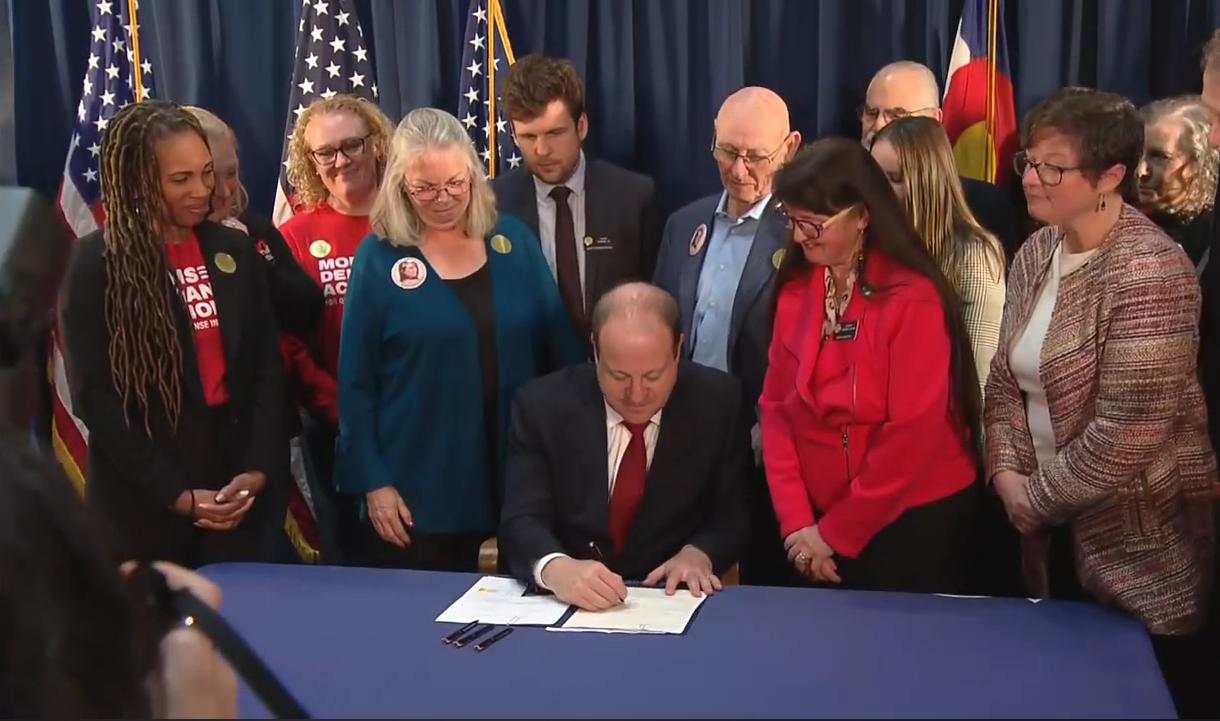
DENVER – Colorado’s Out Democratic Governor Jaren Polis signed four gun control measures Friday aimed at quelling rising suicides and youth violence, preventing mass shootings and opening avenues for victims of gun violence victims to be able to sue the firearm industry.
For many in the state who have advocated for reform, the history of mass shootings in particular has been a focal point although lawmakers were unable to pass a measure that would have banned sales of assault-style weapons in Colorado.
Earlier this month House Bill 1230, that would have banned the sale or transfer of so-called assault weapons, was rejected in a dramatic, 6-7 vote in the House Judiciary Committee at about 1 a.m. following a 14-hour hearing that featured testimony from hundreds of people, the Colorado Springs Sun newspaper reported.
House Bill 1230 was introduced in the aftermath of the mass-shooting at the LGBTQ+ Club Q night club in Colorado Springs that killed five people and injured another 25.
A handful of states including California, Illinois, New York and Maryland have bans on assault weapons.
CBS Colorado noted Friday Before the ink was even dry on Gov. Jared Polis’ signature, gun rights groups sued to reverse two of the measures: raising the buying age for any gun from 18 to 21, and establishing a three-day waiting period between the purchase and receipt of a gun. The courts are already weighing lawsuits over such restrictions in other states.
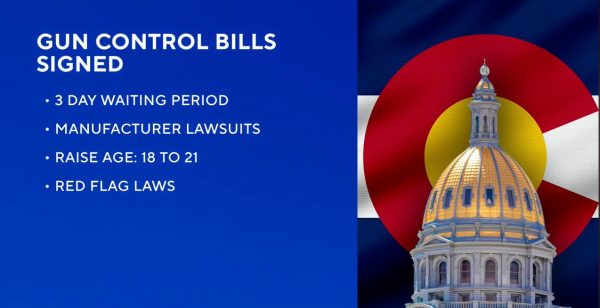
The Colorado Springs Gazette on Mar 15, 2023 published a list of the state’s mass shootings:
Chuck E. Cheese, 1993, 4 dead
On Dec. 14, 19-year-old gunman and former employee Nathan Dunlap opened fire on the staff of an Aurora Chuck E. Cheese, killing four and injuring one employee.
Columbine High School, 1999, 15 dead
Two armed teens went on a shooting rampage April 20, killing 12 students and one teacher, and wounding more than 20 others. After the attack, gunmen Eric Harris, 18, and Dylan Klebold, 17, killed themselves. At the time, this was the largest school shooting in U.S history.
Platte Canyon High School, 2006, 2 dead
On Sept. 27, armed 53-year-old Duane Roger Morrison entered Platte Canyon High School, taking six young girls hostage and sexually assaulted them. Following a three-hour standoff with police, Morrison killed one of the girls before turning the gun on himself.
Youth With a Mission Center and New Life Church, 2007, 5 dead
In the morning of Dec. 9, 24-year-old Matthew John Murray opened fire on the Youth With a Mission Center in Arvada. He killed two, and injured two before escaping. Later that day, he made a similar attack on New Life Church in Colorado Springs, killing two and wounding three before shooting himself.
Aurora Movie Theater, 2012, 12 dead
One armed gunman, later identified as 25-year-old James Holmes, opened fire at a midnight showing of “Batman: The Dark Knight Rises,” killing 12 and leaving 70 wounded.
Arapahoe High School, 2013, 2 dead
Student and gunman Karl Pierson, 18, made an armed attack on Dec. 13 that killed one 17-year-old girl. Pierson took his own life on the scene.
Halloween 2015, 3 killed, shooter killed by police
Noah Harpham armed himself Halloween morning with an AR-15 rifle and two handguns, and went on a bloody rampage near downtown Colorado Springs that ended when Colorado Springs police officers fired on him.
Planned Parenthood, 2015, 3 dead
An armed anti-abortion radical entered a Planned Parenthood facility in Colorado Springs on Nov. 27, killing three including one police officer. Following a standoff that lasted nearly five hours and left nine others injured, the shooter was identified as Robert Lewis Dear Jr., 57.
Walmart, 2017, 3 dead
On Nov. 1, 47-year-old Scott Ostrem opened fire in a Thornton Walmart, killing three shoppers. Ostrem escaped the scene and was later found and arrested in Westminster.
STEM school, 2019, 1 dead
An 18-year-old student, Devon Erickson, opened fire in the Highlands Ranch school, killing one teen and leaving eight others injured. The 18-year-old victim and two other students charged Erickson, an effort that disarmed the shooter but resulted in the student being fatally shot to the chest.
King Soopers, 2021, 10 dead
On March 22, a gunman attacked a Boulder King Soopers grocery store. Among the 10 killed was a Boulder police officer. The suspect, Ahmad Al Aliwi Alissa, has so far been ruled incompetent to stand trial.
Birthday party massacre, 2021, 7 dead
The last mass shooting in Colorado Springs, prior to the Club Q LGBTQ+ nightclub mass-shooting, happened in May 2021, when a gunman killed six members of an extended family at a birthday party at a mobile home in Colorado Springs, before turning the gun on himself. It was the fourth deadliest mass shooting in state history, tied for the deadliest mass murder in the city’s history.
Gov. Jared Polis signs 4 gun safety laws:
-

 a&e features4 days ago
a&e features4 days agoMusical Mondays, a mainstay in WeHo nightlife, celebrates 16 years
-

 National3 days ago
National3 days agoDiscredited former cop played ‘key role’ in deportation of gay make-up artist
-

 Arts & Entertainment2 days ago
Arts & Entertainment2 days agoA Night of legacy, love, and liberation: Inside the 2025 April Fool’s Ball
-

 Arts & Entertainment4 days ago
Arts & Entertainment4 days ago‘Bring it to Brunch’ returns to West Hollywood
-

 Myanmar4 days ago
Myanmar4 days agoLGBTQ+ advocacy group joins Myanmar earthquake relief effort
-

 California3 days ago
California3 days agoSouth Park provides green space to a predominantly Latino community
-

 a&e features4 days ago
a&e features4 days agoPeppermint thrives in the spotlight
-

 Arts & Entertainment2 days ago
Arts & Entertainment2 days agoSouth Coast Repertory Theatre hosting world premiere production
-

 Brazil21 hours ago
Brazil21 hours agoUS lists transgender Brazilian congresswoman’s gender as ‘male’ on visa
-

 Movies1 day ago
Movies1 day agoHeartfelt ‘Wedding Banquet’ remake a romcom worth seeing








